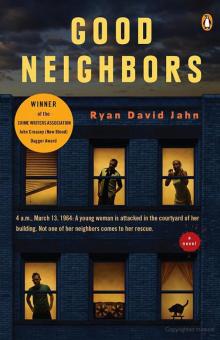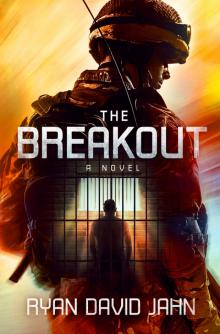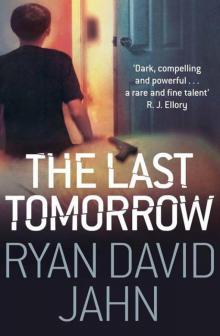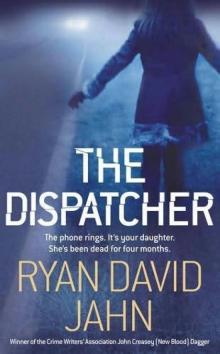- Home
- Ryan David Jahn
The Dispatcher Page 6
The Dispatcher Read online
Page 6
She was standing outside her car with her mouth hanging open and her eyebrows cocked and her eyes wide and glistening with terror. She turned in a frantic circle and said, ‘’Becca?’Becca!’ Then she said, ‘Someone took my daughter!’ Then she put both her fists into her hair and began to pull at it. ‘Help. Someone help. My baby’s gone. Someone took my ’Becca!’
Henry put the truck into gear and pulled out of the parking lot. He watched in the rearview mirror as a store employee ran toward the woman, then he made a right onto the street and drove away and could not see her anymore.
Beatrice loved her. Her face lit up and she held her and stroked her face and loved her. She insisted that Henry get rid of all Sarah’s ‘hand-me-downs’, stuff that they did not get for her, the things she was wearing when Henry took her, so he put them in a bag to throw them away, but because he didn’t want anyone to find them, he buried them in the woods instead. Life returned to normal. Life was good, even; they were simply a happy family living a normal life.
But six months later Henry had to put her into the ground next to her clothes. Bee had forgotten to feed her. She said she’d forgotten, but Henry thought she had stopped lactating after the first Sarah died and hadn’t wanted to admit it to herself; he’d seen the baby suck at her nipple but cry still hungry fifteen minutes later. Either way the second Sarah was dead.
Bee held on to the corpse for a week, refusing to let Henry take it away from her. She held it and rocked it in her arms and tried to brush its hair, but the hair peeled away with a flap of skin and she put the flap back, pretending to herself that it hadn’t happened. Finally when Bee was asleep Henry took it out of her arms and carried it out to the woods and dug a hole. He put it into the hole and tried to say a prayer, one he’d learned in church, but couldn’t remember it, so he made something up about children being innocent and please take this innocent into Heaven, amen, and scooped dirt over its face so he wouldn’t have to look at it any longer.
Two weeks later he found their third Sarah. She lived five years before Henry spanked her too hard. He felt bad about it, it had been an accident, but she’d misbehaved and she needed to be punished, and if he punished her a bit too much, well, that was as much her fault as it was his. If she hadn’t misbehaved in the first place he never would have lost his temper. He put her into the ground beside the last Sarah and went looking for the next.
That one screamed and screamed when he grabbed her and he put his hand over her mouth to silence her. She stopped screaming, but she stopped breathing too.
Then there is this Sarah. He spent a week fruitlessly searching before he finally decided to go up to the petting zoo. It was on the north side of town, near Interstate 10, and mostly people who visited were traveling through. They saw the signs,
BULLS MOUTH PETTING ZOO PUBLIC RESTROOMS
and their kids bugged them till they agreed to stop for half an hour. Since it was Saturday there would probably be a dozen Sarahs to choose from.
It was a pleasant April day with a breeze just strong enough to make the trees whisper.
Kids were running around looking at all the animals-pot-bellied pigs and rabbits and miniature horses-and reaching through the fences to pet them. Some of them were buying celery and carrots from a woman with a vegetable cart.
Everybody else was there with kids. Henry felt very conspicuous walking alone. He felt like he must stand out, the only giant at a midget convention. But nobody seemed worried by his presence. He was in public and behaved accordingly. A sort of dumb open-mouthed smile pushed up his cheeks, his eyes wide and bright, his hands in his pockets, legs doing a going-nowhere shuffle. Just a harmless old man probably there with his granddaughter who’d run off someplace, maybe to use the restroom.
‘Would you care to buy some vegetables to feed the animals?’
‘Not today,’ he said, pulled out his pockets to display them empty, and shrugged.
‘Maybe next time,’ the woman said.
Then he saw her, the Sarah he wanted, standing just behind the woman with the vegetable cart. She was standing beside her daddy and a teenage boy, looking through a fence at an alpaca.
‘Look it, Jeffrey!’ she said as the alpaca pulled a piece of celery from her fingers.
‘I am, dorko.’
‘You’re the dorko, dorko.’
She was the one. Beatrice would love her. Her face was a bright oval, green eyes alive with joy and humor. Beatrice would absolutely love her. He knew she would.
He followed the family around from a distance, waiting for his moment, but her hand remained within her father’s as they walked. Eventually they circled the entire petting zoo and headed for the exit.
He followed them out to a dirt parking lot east of the petting zoo and watched them pile into a red ’65 Mustang with a primer-gray trunk lid. He got into his truck and followed them out to Crouch Avenue, and then left onto Grapevine Circle. They wound round Bulls Mouth Reservoir, water on their right, a bunch of trees and mustang grapevines and blackberry bushes on their left. By summertime half the houses around the reservoir would be loaded with jars of homemade preserves. They pulled the car into a driveway at 44 Grapevine Circle. Henry drove all the way around the reservoir, made a u-turn when he got to an intersection, and went back. He parked across the street and a few houses down. He had to wait for hours, till her mom and dad left without her, and later still, till the teenage boy watching her finally made her go to bed. He sat and waited, urinating into three beer cans while he did so, setting the warm beer cans just outside his truck on the asphalt, and watching the house. He hummed to himself. He nodded once at someone walking by. Once the little girl was in her bedroom Henry got out of his truck and walked the perimeter of the house. He peeked into her window and watched her change for bed. Little Sarah. He waited till she was asleep before cutting the screen away with a box cutter. He didn’t want to scare her before he was near enough to keep her silent.
It was worth it. Beatrice’s face was as joyful as he’d imagined it would be when he presented their new Sarah. It simply lit up like sunshine.
Henry hits a red light at the corner of Crockett and Hackberry and brings the truck to a stop. He finishes his beer, tilting the bottom of the can to the sky, tosses it to the floor where it falls among the other dead soldiers, and pulls a fresh one from its ring. To his right he can see one of Pastor Warden’s dachshunds digging in a flower garden in front of the Skating Palace, head down, dirt flying up from between its legs and arcing through the air before it falls to the sidewalk. He wonders when-if-someone is going to see how scratched up his truck has gotten and make the connection between that and Warden’s fence. There is probably green paint residue on the chain-link fence as well.
The light turns green and Henry’s gas-foot gets heavy.
He pulls his truck into the lot on the east side of the small college campus, parks in front of the two-storey building where all classes are held, and kills the engine. The first floor won’t clear out till ten, but until then he and Mike will be plenty busy with the second floor, which is not used for classes after four o’clock.
He finishes his second beer, grabs the three that remain, as well as his lunch, and steps from the vehicle.
When he walks into the janitor’s closet Mike is already slipping into a blue work shirt. Mike’s a permanent fixture, been here three years now, but not technically a full-time employee of the college. If he works more than a hundred and eighty days he becomes eligible for benefits, so Henry has to lay him off for a month every six so that his work cycle will start anew. He hates to do it, but he can never seem to get approval for a full-time hire.
He walks through the door and smiles. ‘Hey, Mike. Sorry I’m late.’
‘That mean you let me do classrooms tonight?’
‘I’m not that sorry.’
‘But Doug always accuses me of stealing chips from the rack.’
‘Then don’t steal chips from the rack.’
‘I make si
x bucks an hour, Henry.’
Henry shrugs: what are you gonna do? Then he changes into his blue work shirt. He grabs his cart and pulls it away from the wall and checks to make sure it’s properly stocked: cleaning fluids full up, plenty of trash bags, rubber gloves, paper towels, a couple fluorescent tubes in case he stumbles on any that have gone out. Once he’s sure everything is in order he rolls his cart out of there and into the hall.
From now till two o’clock in the morning his job is to get classrooms ready for tomorrow. He likes his work. There’s nothing to it but to do the same thing again and again. It’s relaxing. You find your rhythm and let the night pass you by.
He walks to the cafeteria, which is closed-it closes from four to six-unlocks the door, and walks to the chip rack. He snags a bag of Doritos and heads out, locking the door behind him. Doug will notice, of course, but it doesn’t matter. Henry can just blame Mike.
Ian pulls his car to the curb in front of the house he once called his own. It is nothing special as far as houses go, a brick building fronted by a lawn and a tree with branches like broken fingers, but once upon a time it belonged to him. Now another man sleeps beside his wife and watches baseball on his television and eats food prepared in his kitchen off his plates with silverware he and Deb got as a wedding present from his mom, two years before the lung cancer got her. Bill Finch doesn’t even know there’s a history there; as far as he’s concerned all these things came into existence the moment he got the key to the front door.
After Maggie was kidnapped he spent a long time living in a strange fog, and when Debbie finally asked him to leave the conversation was short. In his mind he supposes he was already gone. He didn’t even look away from the television commercial telling him he needed to switch toilet paper brands.
‘I want you to move out.’
A pause. Then: ‘Okay.’
‘That’s it?’
He nodded.
‘You’re not gonna get mad? You’re not gonna fight me over this?’
He shook his head. ‘No.’
‘Do you wanna know why?’
‘No.’
‘I’m sleeping with Bill Finch.’
‘I know.’
Debbie stood there for a long time. He didn’t look at her, but he could sense her in his periphery. After a while she simply said, ‘Fine,’ and walked away.
The next night he slept on Diego and Cordelia’s couch.
And a week after that he put the extra TV, some books and book cases, a couch from the garage, Maggie’s bed, and his clothes into a truck he rented from Paulson’s U-Haul and drove to his new apartment. He could have afforded a house, but did not see the point. Houses were for people with families and expanding futures. He was no longer one of those people. His future was shrinking.
The first few weeks were strange and sleepless. Not because he missed Deb-he did not exactly miss her-but because he was used to having someone sleeping beside him. Soon enough, though, he got comfortable with the absence. His body learned to spread out across the full width of the bed. He stopped sitting up at night to call Debbie’s name. He stopped believing she was merely in the next room.
Ian knocks on the front door and waits.
He scratches the top of his head where the blond hair is thinnest, then arms the sweat off his forehead. It’s still hellish out.
Debbie pulls open the front door from inside. She’s wearing beige shorts and her white work T-shirt with PINK’S SALON written in cursive across the right breast. She manages the place for Vicki Dodd-who’s the only reason the Dodd family has any money left at all, her brother Carney being useless-and must have just got home. When she sees Ian she frowns. It’s brief, and the frown is immediately followed by a polite smile, but the frown was true and the smile is false. Ian understands this. As far as Debbie is concerned he can be nothing more than a walking reminder of the biggest loss she’s ever suffered. He just looks too much like the daughter she has spent the last seven years trying to forget. She’s tried to bury her again and again. He’s from a part of her life she no longer wants to think about.
‘Ian.’
‘Deb.’
‘What is it?’
‘Have you heard from Bill or Sheriff Sizemore?’
‘No.’
‘Mind if I come in?’
‘Did something happen? Is Bill okay?’
‘Bill’s fine. I thought he might have called you.’
‘About what?’
‘I think you might want to sit down for this.’
‘What is it?’
He doesn’t answer. He simply stands there and waits.
She searches his face for clues, but he gives her none. He keeps his expression blank.
After a moment Debbie steps aside to let him in.
Ian watches Deb as she sits on the couch and looks up at him. Her shoulders are tense, the cords in her neck taut, hands clenching her knees. There was a time when Debbie touched him with those hands, when she caressed him with them. But that was long ago, and he cannot even feel her touch in his memory anymore.
‘What is it?’ she says.
‘It’s Maggie.’
Debbie sighs and the tension leaves her body and she relaxes into familiar bad posture.
‘They found her body,’ she says.
The relief in her voice, the unspoken but nearly audible ‘Thank God,’ makes Ian want to grab her shoulders and shake her and shout at her. What is wrong with you, Debbie? This is your daughter we’re talking about. Your daughter. How dare you sound relieved when discussing her death?
But he knows what’s wrong with her. She wants to move on. The funeral wasn’t enough. It didn’t provide the closure she thinks she needs. Coffins can’t contain memories and dirt cannot cover them. She wants a corpse. She doesn’t understand that even a corpse would not give her what she desires. She doesn’t understand that the dead don’t die until everyone who ever knew them and loved them dies too.
Ian shakes his head.
‘No,’ he says. ‘There’s no body to find,’ he says. ‘She’s alive,’ he says.
And she is no longer seven years old, no longer frozen in time. She is fourteen, fifteen in September, and she called for help today. Right into his ear.
He won’t let her die again.
TWO
Ian opens his eyes. He is lying on the couch, head turned to the right. With one eye he is looking at his work shoes on the floor near the wall opposite. The other eye can see only his out-of-focus shirtsleeve, his arm folded up over his head. One of his shoes is on its side. There is a blackened piece of chewing gum sticking to the heel. He sits up. His neck hurts. Sunlight shines through the dirty living-room window. Six empty Guinness bottles stand like bowling pins on the coffee table, the labels peeled from two of them and stuffed inside like messages floated in on the tide. Near the bottles is a saucepan, the bottom blackened by flame, with a fork poking out of it. Ramen noodles and a small slice of overcooked carrot cling to the inside of the pan. On the far corner of the coffee table, a chessboard with several pieces resting on it, revealing a partially played game. He puts his face into his open hands and rubs at it. Beard stubble against his palms like sandpaper.
His watch’s alarm sounds. He looks at his wrist, but his watch is not there. It’s on the kitchen counter. That means he must stand up.
‘Fuck.’
He gets to his feet and walks to the kitchen and thumbs the watch silent. Then he rinses the ramen pan he used last night, puts two eggs inside, puts enough water into the pan to cover the eggs, and sets the pan on the stove. The turn of a knob makes a clicking sound which is followed after a moment by the poof of orange-tipped blue flames. With that going he gets the coffee pot started as well, scooping coffee into a filter and pouring water into a tank. He presses a button. A red light flashes green. Liquid drips into the coffee-stained carafe. The drops sizzle, dancing on the heated surface.
After pouring a cup of black coffee and peeling his soft-boiled egg
s he walks back to the couch and sits down. He pushes the empty beer bottles aside and pulls the chessboard toward him. He looks at the game in progress. It seems ancient to him, some relic of an era lost in time, but he refuses to consider it abandoned. He bought the chess set from a junk store. It’s a cheap wooden case, lined inside with plaid fabric, one side of its exterior inlaid with veined marble squares to form a playing surface. The pieces were carved also from cheap marble by an apprentice or an old man with shaky hands, and because of the failing of the pieces the set was especially inexpensive. Both the board and the pieces are covered in dust. Ian hasn’t ever brushed them off for fear of disturbing the game, though he has sat and stared at it so frequently, replaying each move in his head, that if knocked to the four corners of the room he could still gather the pieces and reassemble the game in a matter of minutes.
It’s his move. It has been his move for three years. For over three years. And he’s known what his move would be for just as long. It took him an hour of semi-drunken study to figure it out. Queen to b4. But by the time he did figure it out it was late, even in California where Jeffrey was still living with his mother, Lisa, so he decided he would call the next day. Instead he opened up another twelve pack and drank his way through it, drank till the sun rose and he had to drive to work. Three years ago he was still allowing more than a six pack into his apartment at a time. When he got home from work that day the alcohol was finally wearing off and he was hung-over and did not feel up to calling Jeffrey, so another day passed. And another. Then a week passed. Then six months. And how do you call a son to whom you haven’t spoken in six months and say ‘Queen to b4’?

 Good Neighbors
Good Neighbors The Breakout
The Breakout The Last Tomorrow
The Last Tomorrow The Dispatcher
The Dispatcher